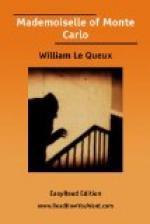And with a laugh he handed the paper to Lisette, who read aloud an account of a daring robbery in one of the best hotels in Cologne—jewels valued at a hundred thousand marks having mysteriously disappeared. International thieves were suspected, but the Cologne police had no clue.
“M’sieur Manfield is always extremely shrewd. He is such a real ladies’ man,” laughed Lisette, using some of the argot of the Montmartre.
“Yes. Do you recollect that American, Lindsay—with whom you had something to do?”
“Oh, yes, I remember. I was in London and we went out to dinner together quite a lot. Manfield was with me and we got from his dispatch-box the papers concerning that oil well at Baku. The company was started later on in Chicago, and only two months ago I received my dividend.”
“Teddy Manfield is a very good friend,” declared the man with the gloved hand. “Birth and education always count, even in these days. To any ex-service man I hold out my hand as the unit who saved us from becoming a German colony. But do others? I make war upon those who have profited by war. I have never attacked those who have remained honest during the great struggle. In the case of dog-eat-dog I place myself on the side of the worker and the misled patriot—not only in Britain, but in all the countries of the Allies. If members of the Allied Governments are profiteers what can the man-in-the-street expect of the poor little scraping-up tradesman oppressed by taxation and bewildered by waste? But there!” he added, “I am no politician! My only object is to solve the mystery of who shot poor Mademoiselle Yvonne.”
The pretty decoy of the great association of escrocs smoked another cigarette, and gazed into the young man’s face. Sometimes she shuddered when she reflected upon all she knew concerning his father’s unfortunate end, and of the cleverly concocted will by which he was to marry Louise Lambert, and afterwards enjoy but a short career.
Fate had made Lisette what she was—a child of fortune. Her own life would, if written, form a strange and sensational narrative. For she had been implicated in a number of great robberies which had startled the world.
She knew much of the truth of the Henfrey affair, and she had now decided to assist Hugh to vanquish those whose intentions were distinctly evil.
At last she rose and wished them bon soir.
“I shall leave the Gare de Lyon at eleven fifty-eight to-morrow, and go direct to Madame Odette’s in Nice,” she said.
“Yes. Remain there. If I want you I will let you know,” answered The Sparrow.
And then she descended the stairs and walked to her hotel.
Next evening Hugh and The Sparrow, both dressed quite differently, left by the Riviera train-de-luxe. As The Sparrow lay that night in the wagon-lit he tried to sleep, but the roar and rattle of the train prevented it. Therefore he calmly thought out a complete and deliberate plan.




